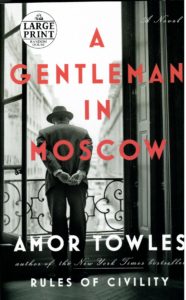 It’s nice sometimes to read a novel, a work of fiction where names, characters, places, and incidents are the product of the author’s imagination. In this case, prepare yourselves to read it as a fairy-tale. Protagonist is Count Alexander Rostov. In the novel Mr. Rostov is always asked about how to be a princess (by 6 y.o. girl), how to be a gentleman (by a Communist Party member), how to taste a real cucumber soup (by a kitchen staff). Count Rostov worked as a Headwaiter at the Metropol Hotel in Moscow, Russia, and made friends with co-workers.
It’s nice sometimes to read a novel, a work of fiction where names, characters, places, and incidents are the product of the author’s imagination. In this case, prepare yourselves to read it as a fairy-tale. Protagonist is Count Alexander Rostov. In the novel Mr. Rostov is always asked about how to be a princess (by 6 y.o. girl), how to be a gentleman (by a Communist Party member), how to taste a real cucumber soup (by a kitchen staff). Count Rostov worked as a Headwaiter at the Metropol Hotel in Moscow, Russia, and made friends with co-workers.
As it is described on page 327:
“As a host, it was perfectly appropriate for you to take the serving tools. But a gentleman,said the Count, would have served his guest before he served himself, a gentleman wouldn’t gesture at another man with his fork” etc.
This is one part of the book. The other part deals with the reminiscences of Count’s provenance. Page 425 reads: “As we age, we are bound to find comfort from the notion that it takes generations for a way of life to fade. We are familiar with the songs our grandparents favored, after all, even though we never danced to them ourselves. At festive holidays, the recipes we pull from the drawer are routinely decades old, and in some cases, even written in the hand of a relative long since dead.
And the objects in our homes?
The oriental coffee tables and well-worn desks that have been handed down from generation to generation? Despite being “out of fashion”, not only do they add beauty to our daily lives, they lend material credibility to our presumption that the passing of an era will be glacial.”
Read yourself, my dear friend, and judge it.
Listen to the beautiful music: